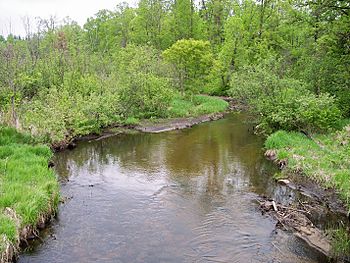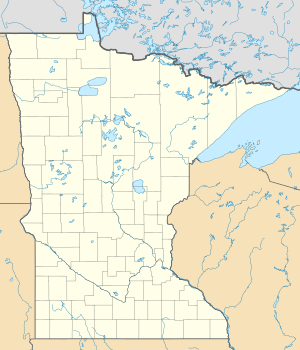Blueberry River (Minnesota) facts for kids
Quick facts for kids Blueberry River |
|
|---|---|

The Blueberry River in Blueberry Township in 2007
|
|
|
Location of the mouth of the Blueberry River
|
|
| Country | United States |
| State | Minnesota |
| Physical characteristics | |
| Main source | Green Valley Township, Becker County 1,506 ft (459 m) 46°50′30″N 95°16′45″W / 46.84167°N 95.27917°W |
| River mouth | Blueberry Lake, Shell River Blueberry Township, Wadena County 1,362 ft (415 m) 46°46′48″N 95°05′34″W / 46.78000°N 95.09278°W |
| Length | 20 mi (32 km) |
| Basin features | |
| Tributaries |
|
The Blueberry River is a small river in north-central Minnesota, United States. It is about 20 miles (30 km) long. The river is a tributary, which means it's a smaller stream that flows into a larger river. The Blueberry River flows into the Shell River.
From there, its waters join the Crow Wing River. Eventually, all these rivers become part of the huge Mississippi River. This means the Blueberry River is part of the watershed of the Mississippi River. A watershed is an area of land where all the water drains into one main river.
What's in a Name?
The name "Blueberry River" comes from the Ojibwe language. It is a direct translation of the river's original name given by the Ojibwe people.
Where the Blueberry River Flows
The Blueberry River starts in Green Valley Township. This area is in southeastern Becker County. From its start, the river generally flows towards the southeast.
It travels a short distance through southwestern Hubbard County. Then, it enters northwestern Wadena County. Along its journey, another river, the Kettle River, flows into it.
The Blueberry River also passes through the city of Menahga. Finally, it flows into Blueberry Lake. This lake is part of the Shell River system in Blueberry Township. This spot is about two miles (3 km) north of Menahga.
Nature Around the River
The area where the Blueberry River flows is called the Northern Lakes and Forests ecoregion. An ecoregion is a large area of land or water that has similar plants, animals, and climate.
This ecoregion is known for its forests. You can find both conifer trees (like pine and spruce) and hardwood trees (like oak and maple). The land itself is made up of flat and rolling till plains and outwash plains. These are types of landforms created by ancient glaciers.
 | DeHart Hubbard |
 | Wilma Rudolph |
 | Jesse Owens |
 | Jackie Joyner-Kersee |
 | Major Taylor |


